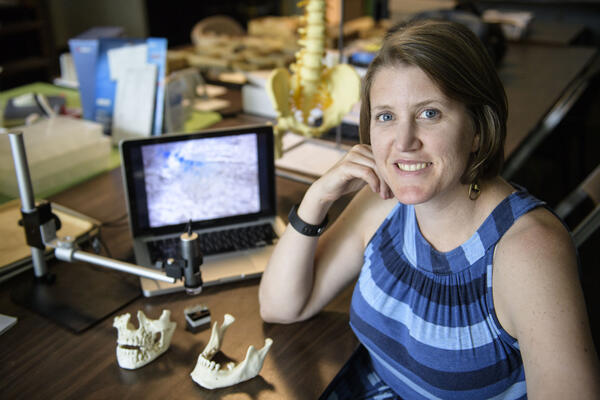On this page:
- Why Choose Anthropology?
- Careers
- Real-World Experience
- Success Stories
- Academics and Curriculum
- Admission
Why Choose Anthropology?
Major in anthropology and take courses that will enable you to look at the world through an “anthropological lens.” More specifically, courses in anthropology will equip you with the ability to:
- Remain an open-minded, but critical, lifelong learner
- Develop an understanding of and appreciation for human cultural diversity
- Navigate an increasingly globalized society
- Recognize there are many ways to approach “real-world” problems of all kinds (social, economic, political, etc.)
The Bachelor of Arts program in anthropology focuses on and prepares you to be competent in three areas: cultural anthropology, biological anthropology, and archaeology.
Cultural Anthropology studies the interrelationship between culture and society to give meaning to the world around us. It explains the social and cultural similarities and differences demonstrated around the world. It analyzes and interprets human diversity through such dynamics as language, identity, and representation, family and religious systems, political and economic configurations, and the environments people have used to shape their societies. Careers can include academic appointments, market research, direction of nonprofits, cultural liaisons, civil affairs, policy making, and more.Biological Anthropology focuses on biological variation among living and past human populations, including the evolutionary pathways that have led humans to adapt to a variety of environments over the past 4 million years. You will gain practical knowledge in biomedical research, animal behavior, anatomy, and physiology. Careers can include academic appointments, human factors research, forensic science, grant writing, museum work, genetic research, and more.
Archaeology examines human life using material remains of the past, whether 100,000 or only 100 years old. Courses convey substantive knowledge of past cultures and societies, artifact analysis, and archaeological fieldwork. Coursework in archaeology gives you a window into how studying our past can impact our future. Careers can include academic appointments, park ranger, field research, cultural resource management, historic preservation, and more.
View Human-thropology: What is Anthropology? to learn more.
Careers
You might be surprised to learn our students have many career options, though few will have “anthropologist” as their job title. An academic track involves more coursework (M.A. and/or Ph.D.) and often results in a career as a researcher and college professor. An applied track can require additional training but usually translates into a dynamic career using anthropological knowledge to solve “real-world” problems. What careers do our alumni undertake? We work closely with you to help you identify a career that meets your interests, goals, and skill sets. Below is a list from some of our most recent alumni.
Our Graduates Work As
- Museum curator
- Archivist
- Owner of cultural resource management and historic preservation firms
- Attorney
- College professor
- Government positions such as:
- Park ranger
- Contractor
- Military officer
- Police detective
- Professional archaeologist
- Specialist work such as:
- Geographic information systems
- Anthropometric research
- Forensic investigation
- Genetic research
- Grant writing
- Technical writing
- Public health
- Science policymakers
- Market research
Real-World Experience
A lot of student learning occurs outside of the classroom. Wright State works to provide opportunities for you to interact and apply what you are learning. Highlights include:
- Student research and study abroad programs
- Independent studies, including work in the anthropology lab
- Internships, job shadowing, and volunteering in the community
Success Stories
Academics and Curriculum
View Bachelor of Arts in Anthropology program information and requirements in the Academic Catalog.
View the Anthropology checksheet (PDF).
Admission
Review the college admission requirements and complete the admission application. Identify whether you will be majoring in anthropology.
If you are a current student and wish to change majors, submit a Major/Minor Change Request by logging in to WINGS, then select Student Academics under Your Launchpad. If you are an undecided/exploratory student, talk to your advisor about majoring in anthropology.


